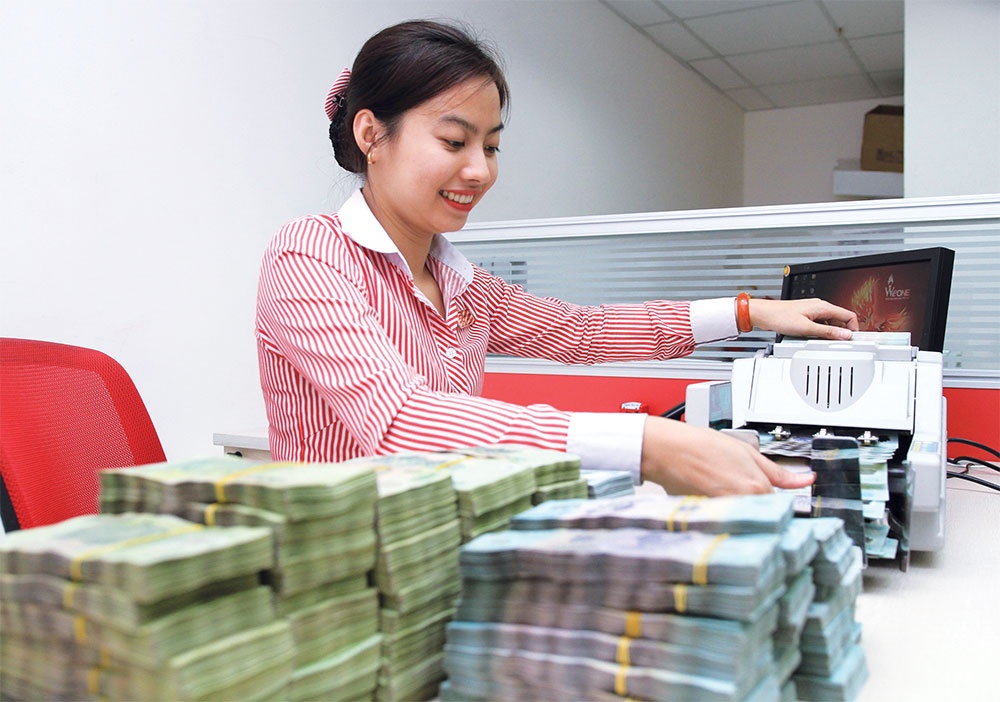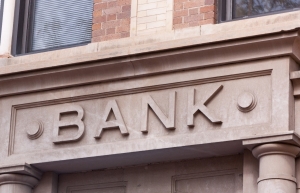Banks post uplifting results despite underlying risks
The results were said to still be strong, not only doubling but even tripling compared to the same period last year. This comes not unexpected as GDP recorded in the third quarter of the years was the highest it has been in many years, reaching 13.67 per cent compared to the same period last year.
 |
| Bank profits were strong in the first nine months of the year, photo Le Toan |
Rising interest rates are making it increasingly expensive for companies and consumers to borrow money, while monetary policy tightening is accelerating in both frequency and the level of interest rate hikes.
Experts assess that the ‘cheap money’ era might be coming to an end, with bad debts being the underlying issue.
Positive growth in the first nine months was reflected in all economic activities, especially consumption.
Total revenue from retail and consumption services also increased sharply by 21 per cent on-year, while disbursement of foreign direct investment grew by 16.3 per cent on-year, and exports by 17.3 per cent while imports increased by 13 per cent on-year.
Short-lived growth
However, according to senior economist Le Xuan Nghia, the joy is expected to be short-lived, as the main growth driver, the benefits of the economy reopening, will gradually decrease, while public investment has not seen a breakthrough.
“Firstly, the price of raw materials was already at a high level before it increased by 6 per cent over the previous year and about 12 per cent in the past two years.,” Nghia assessed.
“Secondly, the global economy is less favourable, affecting trade prospects as well as international capital flows.
“Thirdly, financial conditions are tight, as capital channels such as credit, stock market, and corporate bonds are all facing difficulties due to international pressure as well as internal problems.”
Dinh Quang Hinh, head of Macro and Market Strategy at VNDirect, said that along with the management agency’s efforts in cleaning up the capital market, Decree No.65/2022/ND-CP on private placement of bonds has just been issued.
However, a number of market participants, including issuers, consulting firms and investors, have said they need time to adjust to the new regulations.
“Therefore, the corporate bond market is likely to continue to be quiet in the next few quarters,” Hinh forecast.
Market data from VNDirect as of early October shows that the total value of corporate bonds issued in the third quarter decreased by 50.5 per cent compared to the previous quarter and by 70.9 per cent over the same period.
In the first nine months of 2022, the total value of corporate bonds issued is estimated at $10.3 million, down 43.5 per cent compared to the first nine months of 2021.
Notably, the pressure of bond maturity will increase from the fourth quarter of 2022, up 87.7 per cent over the same period.
In this, the maturity ratios of corporate bonds of the real estate and finance and banking sectors are 34.1 and 32.9 per cent, respectively.
Real estate enterprises with the highest maturity value in the fourth quarter include Sunshine Group JSC (including the company’s subsidiaries), Nova Real Estate Investment Group JSC, and Bach Hung Vuong JSC. Leading in the finance-banking group are Techcombank, VIB, and VPBank.
Meanwhile, last September, the stock market recorded a decrease of about 12 per cent compared to August and at the beginning of October, the market continued to decrease in both score and liquidity.
According to Hinh of VNDirect, rising interest rates are expected to affect the valuation of the stock market, as the opportunity cost of investing in securities is higher, while higher interest slows down corporate profit growth.
Thinning debt settlement platforms
One bright spot in the market has been the credit limit adjustment for four banks participating in supporting weak credit institutions according to the government’s policy, namely VPBank, MB, HDBank, and Vietcombank.
According to VNDirect, after this adjustment, almost $3.5 billion will be added to the economy. With the update on credit growth in 2022 of 18 banks (accounting for about 80 per cent of the system’s credit), the total credit growth of this group will reach approximately 13.6 per cent at year-end.
Nghia assessed that with the orientation of stabilising inflation and exchange rate, the State Bank of Vietnam’s (SBV) will remain cautious in monetary policy in the last months of 2022 and early 2023. Therefore, the SBV credit limit target will still remain at 14 per cent, which means there is almost no opportunity for more adjustment and money supply will continue to be tightly controlled.
“Despite the positive earnings in the third quarter of 2022 compared to the same period in 2021, the prospect of significant growth will likely no longer be maintained in the fourth quarter of 2022,” Nghia said. “This period may also start recording a decline in growthof profits.”
In related developments, financial reports of credit institutions showed that the average bad debt ratio increased to 1.34 per cent at the end of the second quarter of this year, compared to 1.28 per cent at the end of last year.
With the SBV’s Circular No.14/2021/TT-NNNN expiring at the end of June 2022, a sudden spike in bad debt risk will occur in the second half of 2022.
A general director of a joint stock commercial bank told VIR that the strong increase in profits of banks in recent years is the foundation for a solid reserve buffer and a high ratio of bad debt coverage.
“However, the deterioration in the market is an indicator that profits will no longer grow as strongly as before, in the context of general difficulties of the economy, which will cause bad debts to increase sharply and the risk reserve buffer to thin down,” the general director said.
Can Van Luc, chief economist at BIDV and member of the National Financial and Monetary Policy Advisory Council, forecast that the situation was highly likely to persist. “On-balance sheet bad debt in 2022 will be pushed up to about 2 per cent and the gross bad debt will move up to around 6 per cent,” Luc said.
 | PM underlines banking system's role as arteries of economy Prime Minister Pham Minh Chinh said the banking system plays the role as arteries of the economy while addressing a meeting with chairpersons and CEOs of commercial banks in Hanoi on October 16. |
 | Which banks lead international risk management standards? Besides Basel II, many banks have also applied Basel III and IFRS 9. These international standards help banks improve risk management and competitiveness compared with their peers, which also contributes to the effective and sustainable development of the credit institution system. |
What the stars mean:
★ Poor ★ ★ Promising ★★★ Good ★★★★ Very good ★★★★★ Exceptional
Related Contents
Latest News
More News
- Cashless payments hit 28 times GDP in 2025 (February 04, 2026 | 18:09)
- SSIAM and DBJ launch Japan Vietnam Capital Fund (February 04, 2026 | 15:57)
- Banks target stronger profits, credit growth in 2026 (February 04, 2026 | 15:43)
- Vietnam on path to investment-grade rating (February 03, 2026 | 13:07)
- Consumer finance sector posts sharp profit growth (February 03, 2026 | 13:05)
- Insurance market building the next chapter of protection (February 02, 2026 | 11:16)
- NAB Innovation Centre underscores Vietnam’s appeal for tech investment (January 30, 2026 | 11:16)
- Vietnam strengthens public debt management with World Bank and IMF (January 30, 2026 | 11:00)
- Corporate bond market poised for stronger growth cycle (January 28, 2026 | 17:13)
- Vietnam's IPO market on recovery trajectory (January 28, 2026 | 17:04)

 Tag:
Tag:




















 Mobile Version
Mobile Version